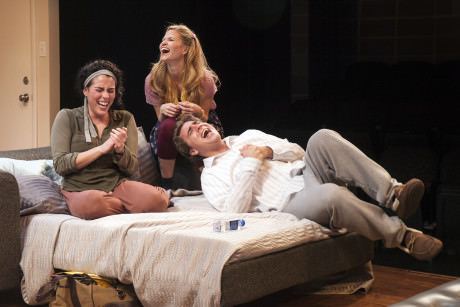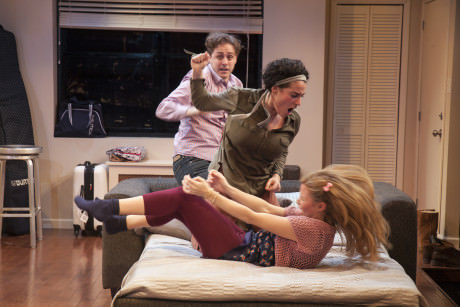When I first saw Joshua Harmon’s brilliant play Bad Jews at The Studio Theatre about this time last year, I could not contain my enthusiasm. I praised it to the skies:
Bad Jews is so over-the-top funny, so razor-sharp smart, and so plumb-the-depths profound that it left me gobsmacked in utter awe…. Bad Jews is a perfectly polished gem—a don’t-miss gift of exceptional theater whichever holiday you observe (or don’t).
I could not have imagined the show could get any better. It broke all box office records for Studio, which kept extending the run until it couldn’t anymore because another show was booked into the space. Now back on stage—literally by popular demand—Studio’s revival of Bad Jews offers those who missed it a serendipitous reprieve: another chance to catch this irresistibly hilarious and astonishingly heartfelt comic masterpiece.

Yesterday I got a chance to reappreciate the production—and I was enthralled all over again. The creative team headed by Director Serge Seiden is still the same. The set, lights, sound, costumes are the same. Harmon’s scintillating script has not changed. Yet the show plays even better than before. The humor is even more truth-based, the nonverbal moments even more nuanced, the characters even more vivid, the story arc even more moving and meaningful.
How, I wondered, could that possibly be?
Three of the four actors are new to this year’s production—the three who portray twenty-something cousins in a Jewish family who have gathered on the occasion of their beloved grandfather’s death. Laura Lapidus now plays Daphna, the one who is religiously observant and has a headful of steam and hair. Her antagonist, Liam, the lanky brainiac who does not share her religious fervor and thinks little of their tradition, is now played by Noah Averbach-Katz. Rowan Vickers now plays Jonah, Liam’s quiet younger brother who tries not to be involved in Daphna’s and Liam’s ferocious feud over their Poppy’s chai—a religious keepsake that survived the Holocaust along with Poppy and is steeped in family history.
The fourth cast member, Maggie Wilder (née Erwin), returns as Melody, Liam’s good-hearted shikse sweetheart and opera singer manqué. Wilder’s memorable, comically off-key “Summertime” vocal once more brought the house down to smithereens.
As a foursome the cast is fearsomely funny. They engage us, sometimes outrage us. Daphna and Liam each have what Artistic Director David Muse calls “seething rant-arias,” in which they dispute not only their claim to the chai but the very form and content of Judaism, and Lapidus and Ayerback-Katz deliver Harmon’s fusilades of scathing invective with drop-dead showstopping firepower.
Yet at the same time there is immense warmth and heart within this show—borne mainly of Vickers’s and Wilder’s sensitive performances—and those qualities draw us into the world of the cousins’ comic conflicts with such touching precision and authenticity that it’s as if for the time being we are members of this extended, eccentric family.
There’s one important interpretive shift in this year’s production: Daphne is now played with a disarming smile on her face, especially at the beginning, even when she is saying stinging things. The adjustment works terrifically to offset Daphne’s acidity yet stay faithful to the script—in which the character as written has a bitchy streak. The portrayal of Liam has been modulated as well. His tirade about Daphne—a misogynist screed—is as horrifying to hear as Melody says. But when Liam’s softer side appears, as when he professes his devotion to Melody, it seems genuinely to supplant the rancor of his rant.

As I marveled at the ensemble performance of Lapidus, Vickers, Ayenbach-Katz, and Wilder, I sensed that under Seiden’s direction this fresh cast had uncovered a profusion of subtle new comic details in Harmon’s script. For example, they punched up words in the midst of speeches that might each have had one laugh before but now had a galeful more. And with countless spot-on wordless gestures they got situational guffaws at points that became more riotous in the moment than the dialog. It was as if the show were a stew prepared from a fine family recipe and had simmered for such time that marinated flavors not apparent before were now pleasuring another generation’s palette anew.
Quite simply The Studio Theatre’s remounted Bad Jews is DC theater’s funnest and tastiest feast of the season.
Running Time: Approximately 90 minutes, with no intermission.
Bad Jews plays through January 3, 2016, at The Studio Theatre’s Mead Theatre – 1501 14th Street, NW, in Washington, DC. For tickets call (202) 332-3300, or purchase them online.





